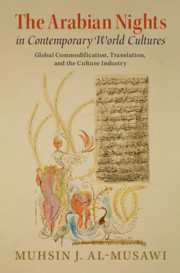 The Arabian Nights in Contemporary World Cultures
The Arabian Nights in Contemporary World Cultures Book contents
- The Arabian Nights in Contemporary World Cultures
- Frontispiece
- The Arabian Nights in Contemporary World Cultures
- Copyright page
- Dedication
- Contents
- Figures
- Acknowledgments
- Introduction
- 1 The Arabian Nights
- 2 The Scheherazade Factor
- 3 Engagements in Narrative
- 4 The “Hostile Dynasty”
- 5 The Archaeology of A Thousand and One Nights
- 6 Signatures and Affiliates
- 7 Decolonizing the Arabian Nights?
- 8 Invitation to Discourse
- Book part
- Select Bibliography
- Index
Introduction
The Stunning Growth of a Constellation
Published online by Cambridge University Press: 17 August 2021
- The Arabian Nights in Contemporary World Cultures
- Frontispiece
- The Arabian Nights in Contemporary World Cultures
- Copyright page
- Dedication
- Contents
- Figures
- Acknowledgments
- Introduction
- 1 The Arabian Nights
- 2 The Scheherazade Factor
- 3 Engagements in Narrative
- 4 The “Hostile Dynasty”
- 5 The Archaeology of A Thousand and One Nights
- 6 Signatures and Affiliates
- 7 Decolonizing the Arabian Nights?
- 8 Invitation to Discourse
- Book part
- Select Bibliography
- Index
Summary
This study of the Thousand and One Nights addresses the place of what is commonly called Arabian Nights in contemporary world cultures.1 It aims to study theoretical and philological undertakings, including poetics of prose and poetry, in conversation with social science. It explores and excavates the reasons for and effects of an enormous constellation of knowledge about and around the tales that has generated further projects to compile manuals, guides, companions, edited compilations, and encyclopedias.2 These constellations and projects also build on, or converse with, cinematic production, theater, painting, music,3 and other visual sites and spectacles. Since its early inception in translation, 1704–12/17 (Les Mille Et Une Nuits: Contes Arabes), it has sustained an unequalled presence in cultural production. The enormous increase in scholarship on A Thousand and One Nights (the Arabian Nights) is further indicated by the multiplication of publications that take the tales as their focus and concern.4 Whether this scholarship addresses issues of translation, the appropriation of the tales in visual culture, or in media, its growth evidences a massive production of published materials, one that prompts us to speak of A Thousand and One Nights as a field of knowledge.
- Type
- Chapter
- Information
- The Arabian Nights in Contemporary World CulturesGlobal Commodification, Translation, and the Culture Industry, pp. 1 - 22Publisher: Cambridge University PressPrint publication year: 2021


